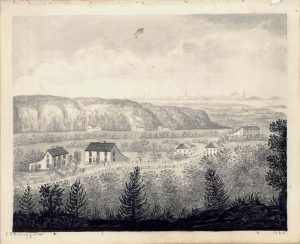By Neal Millikan, Series Editor for Digital Editions, The Adams Papers
Transcriptions of more than 500 pages of John Quincy Adams’s diary have just been added to the John Quincy Adams Digital Diary, a born-digital edition of the Adams Papers editorial project at the Massachusetts Historical Society. The new material spans the period September 1801 through July 1809 and chronicles Adams’s experiences as a senator in Washington, D.C., and a professor at Harvard.
John Quincy Adams was selected to be a member of the U.S. Senate in February 1803, elected to the position by a Massachusetts legislature controlled by the Federalist Party. Taking his seat in October, Adams charted an independent political course, voting on issues as he believed they related to the national good and not simply to Federalist interests. This was most obvious when he voted for the embargo in December 1807, which sought to punish France and Great Britain for their punitive trade restrictions by prohibiting U.S. vessels from trading with European nations.
By supporting the embargo, Adams in effect voted against the Federalist Party, whose New England contingent relied heavily on merchant shipping for their economic livelihood. He was also supporting the policy of President Thomas Jefferson, his father John Adams’s political adversary. Jefferson, who had defeated the senior Adams in the presidential election of 1800, was the leader of the opposition party, the Democratic-Republicans. After the embargo vote, John Quincy recorded his reasoning in his diary: “On most of the great national questions now under discussion, my sense of duty leads me to support the administration, and I find myself of course in opposition to the federalists in general.” He went on, however, to clarify that he had “no Communication with the President other than that in the regular order of business in Senate.” Indeed, Adams recognized that owing to his personal stances on the main issues of the day, “my political prospects are declining.”
As his political career floundered during this period, his personal finances also received a setback due to the 1803 failure of London bankers Bird, Savage, and Bird. While this failure negatively impacted John Quincy’s savings, he was more worried about his parents, John and Abigail Adams, for whom he had heavily invested with Bird, Savage, and Bird, the funds planned for their retirement. To help protect his mother and father from financial ruin, John Quincy sold his personal property and practiced extreme personal economy. He moved his family out of their Boston home and back in to the small house in Quincy, Massachusetts, where he had been born. He recounted these actions in his diary, noting that while “I have practiced all the economy I thought practicable” he found to have “needed still more.”

There were, however, some bright spots for John Quincy Adams during these years. He and his wife, Louisa Catherine Adams, and eldest son, George Washington Adams, welcomed two additional children into their family: John Adams was born on 4 July 1803 and Charles Francis Adams on 18 August 1807. He also enjoyed his tenure as the Boylston Professor of Rhetoric and Oratory, a position to which he was elected by the Corporation of Harvard University on 24 June 1805. He spent significant time researching and writing thirty-six lectures, delivering the first one on his thirty-ninth birthday, 11 July 1806. After that lecture, he proudly recorded in his diary that it “was well received, and could I hope that the issue of the whole course would but bear a proportion to the effect of this introduction, I should be fully satisfied.” The lectures were published in 1810.
For more on his life in this period, read the headnote, or, navigate to the entries to begin reading his diary. With this release, transcriptions of forty years of John Quincy Adams’s diary, from 1789 to 1829, are now freely available on the MHS website. In addition, the side-by-side viewer tool allows users to access images of the over 5,700 diary manuscript pages that accompany these transcriptions.
The Adams Papers editorial project at the Massachusetts Historical Society gratefully acknowledges the generous support of our sponsors. Major funding for the John Quincy Adams Digital Diary was provided by the Amelia Peabody Charitable Fund, with additional contributions by Harvard University Press and a number of private donors. The Andrew W. Mellon Foundation in partnership with the National Historical Publications and Records Commission also support the project through funding for the Society’s Primary Source Cooperative.

